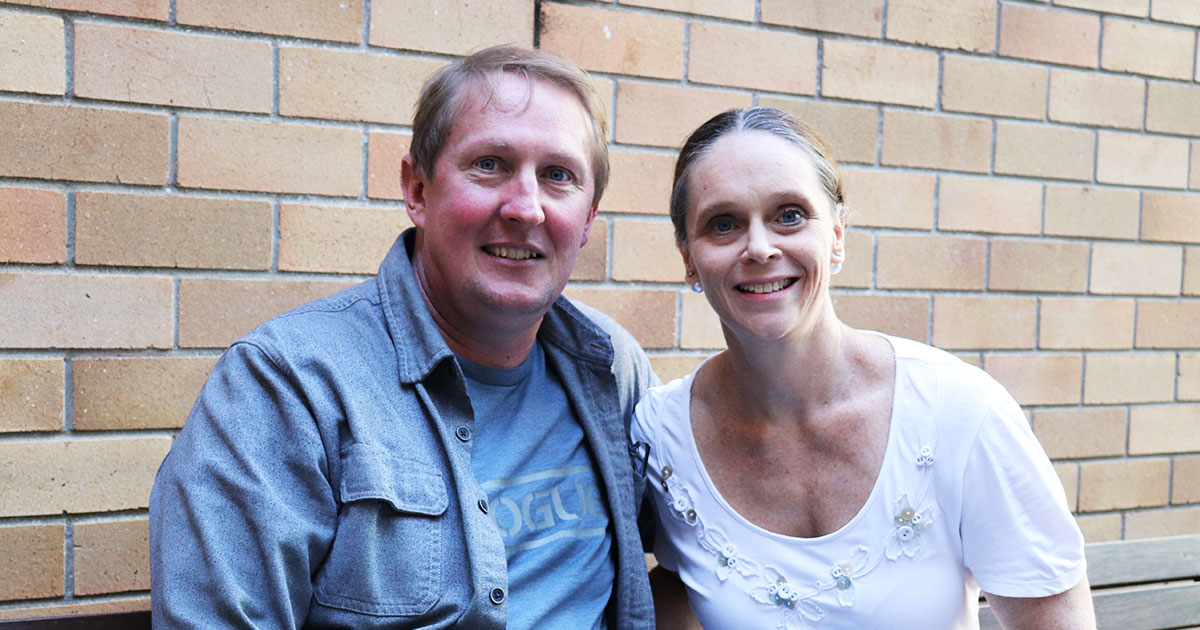Tony’s battle with Bowel Cancer

In February of 2021 Tony woke up feeling fine and had a normal Sunday breakfast with his family but later that day he was in hospital being diagnosed with aggressive bowel cancer.
He had no prior warning signs and up until that day had felt healthy and well.
The 47-year-old worked in the Air-Force and had just been posted to Brisbane which he was delighted about as he was able to spend more time with his wife and teenage son.
“My wife Ailsa went to the movies in the afternoon, I was home taking care of my son when I started to feel cold,” Tony said.
“I went to lie down but then started experiencing nausea and vomiting, I went to have a shower which is where Ailsa found me curled up on the floor when she came home.
“She found me unable to move and immediately put me in the car straight to hospital, I was very out of it and by this point had a fever.”
At the Wesley Hospital Emergency Centre Tony had a CT scan which revealed masses in his bowels, the tumours were so large they were crushing his organs which was leading to a kidney infection.
“I originally had a stent put in to help my kidney but then I was given a colonoscopy by Dr Carina Chow and they saw the extent of the cancer,” Tony said.
“I had surgery on Wednesday to remove the tumours and my kidney which took eight hours as the cancer had spread to my small intestine but thankfully not my lymph nodes.
“I had to stay in hospital for about two weeks after that until I started chemotherapy, having the portacath put in was the most traumatic experience.”
Tony explains the next day he started six months of chemotherapy. “While I was having chemotherapy I still continued to work, I needed something to keep me busy and my colleagues treated me so well,” Tony said.
“The chemotherapy was exhausting, I could barely walk up and down the stairs without feeling winded.
“After the chemotherapy finished I had to have another PET scan which unfortunately uncovered more cancer in my liver, I needed another surgery to remove this and another six months of chemotherapy.”
Tony said following the chemotherapy he received immunotherapy treatment which was again very draining to go through.
“It made the skin on my face, hands and feed bleed, my skin is still red from this treatment and I will be on immunotherapy for the next five years at least, although thankfully we changed immunotherapy drugs and the new one is much better without the side effects,” Tony said.
“My diagnosis came as a complete surprise, I didn’t have any warning signs of cancer but after investigation I did find out I had a family history of the disease.
“Family history is a huge risk factor for bowel cancer so if you have people in your family who have had the disease make sure you get yourself checked out.”
Tony said the strength and support of his family got him through his treatment, particularly his wife, Ailsa.
“I am feeling better now, I have never been one to sit around and feel sorry for myself, I like feeling like I am useful,” Tony said.
“I try to adopt the Monty Python perspective of ‘Always look on the bright side of life’ for now all my PET scans are clear and I am hopeful they stay clear.”
Additional Information
According to Bowel Cancer Australia, patients under 50 have an increased risk of developing bowel cancer when they experience one or more of the following symptoms between three months and two years prior to diagnosis:
- Abdominal pain
- Rectal bleeding
- Diarrhoea
- Iron deficiency anaemia
Australians are eligible to take part in the National Bowel Cancer Screening Program from the age of 50.
People with a family history of bowel cancer are encouraged to have regular colonoscopies starting 10 years prior to their first-degree relative’s diagnosis. For example, if your mother was diagnosed at 45-years-old with bowel cancer you should start having colonoscopies at 35-years-old.














